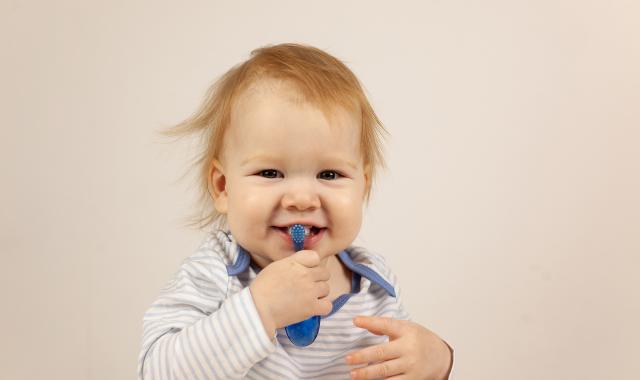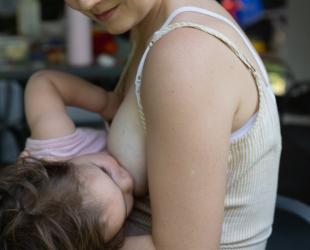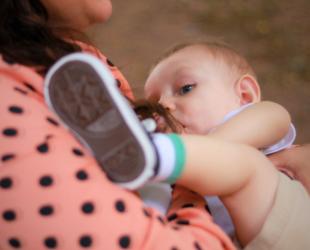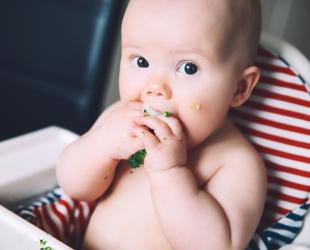Breastfeeding overnight is normal and safe. Here’s what you need to know about your child's teeth.

Breastfeeding to sleep and during the night is normal and not shown to cause tooth decay. Research shows that other factors, like sugary foods, poor dental hygiene and family health play a part.
But many parents are told that breastfeeding to sleep or feeding overnight will harm their child’s teeth.
Where does this idea come from?
- Misunderstood research: Some studies have suggested a link between breastfeeding and tooth decay, but these studies often didn’t consider how much sugar children were eating or drinking. We know that sugary foods and drinks are a major cause of tooth decay.1
- Assumptions about cleaning teeth: The concern is that if you breastfeed your baby to sleep, you’re not cleaning their teeth after the feed. Similarly, if you feed during the night, you’re unlikely to clean their teeth.
- Not understanding how breastfeeding works: When a baby breastfeeds, the nipple is drawn to the back of their mouth and milk goes straight to their throat. No milk settles around their teeth. When a baby falls asleep at the breast and stops sucking, the flow of milk stops. This means no milk is left in their mouth.1
This is very different from bottle feeding, where milk comes out into the front of the baby’s mouth and settles around their teeth. If the baby falls asleep, the teat may slowly leak any milk left in the bottle into their mouth.2
What does the research really say?
- The research into breastfeeding and oral health is still evolving. Overall, studies have shown that breastfeeding up to 12 months protects against tooth decay.1
- Studies about tooth decay and breastfeeding beyond 12 months have mixed results but often don’t consider how much sugar children also eat or drink.1
- A 2020 study found no link between breastfeeding beyond 12 months and tooth decay. Instead, children who ate more sugary foods or who came from families with lower incomes had more decay.3
- Another study found no link between breastfeeding beyond 24 months and tooth decay in children who drank fluoridated water. This suggests that giving your child water with fluoride can help protect their teeth.4
Bottom line:
When babies start eating other foods, especially those with added sugars, the risk of tooth decay increases.2,3 Good dental hygiene (like cleaning teeth) and healthy eating habits are the best ways to protect your child’s teeth.
What actually causes tooth decay?
Some things can make tooth decay more likely for young children:
- Sugar intake and poor eating habits of the family. Limit your child’s intake of sugary foods and drinks. Drink fluoridated tap water.
- Bacteria (like Streptococcus mutans) entering the baby’s mouth: Can be passed from parents or caregivers by kissing them on the mouth, sharing cups or spoons or sucking on a baby’s dummy to clean it.
- Less saliva: Saliva reduces the risk of tooth decay because it helps to wash sugars from the teeth and also reduces acidity. Saliva flow naturally reduces during sleep. Saliva flow may also be lower if a child was born early, has asthma or diabetes, or if they are using some medicines.
- Poor oral hygiene: No matter how your baby is fed, it's important to clean their teeth properly (twice a day) once their teeth begin to appear. Take your child for regular dental check-ups.
- Family genetics or health conditions during pregnancy. A baby's teeth begin to form long before they are born. In some cases, children are born with weak tooth enamel or other defects that increase their risk of tooth decay.
- Mum smoking during pregnancy
- Other health conditions: These include low birth-weight (including prematurity), malnutrition, asthma, recurrent infections and chronic diseases.
Practical tips for parents
- Breastfeed your child for as long as you both want. It’s good for both of you.
- If breastfeeding your child to sleep is part of your routine and works for you, it’s okay to keep doing it.
- Clean your child’s teeth carefully twice a day, from the time they first appear (6-12 months of age). You don’t need toothpaste before 18 months.
- Offer water with fluoride.
- Avoid sugary foods and drinks.
- Take your child for regular dental check-ups.
Further reading:
Royal Children's Hospital Melbourne: Fact sheet for parents - Oral health
- Tham R, Bowatte G, Dharmage SC, et al. Breastfeeding and the risk of dental caries: a systematic review and meta-analysis. Acta Paediatr. 2015;104(467):62–84. https://doi.org/10.1111/apa.13118
- Australian Dental Association (NSW Branch). Caring for your child’s teeth. https://www.adansw.com.au/wp-content/uploads/ADA021-Caring-for-your-childs-teeth.pdf
- Devenish G, Mukhtar A, Begley A, et al. Early childhood feeding practices and dental caries among Australian preschoolers. Am J Clin Nutr. 2020;111(4):821–828.
- Ha DH, Spencer AJ, Peres KG, et al. Fluoridated Water Modifies the Effect of Breastfeeding on Dental Caries. J Dent Res. 2019;98(7):755–762. https://doi.org/10.1177/0022034519843487
© Australian Breastfeeding Association January 2026


